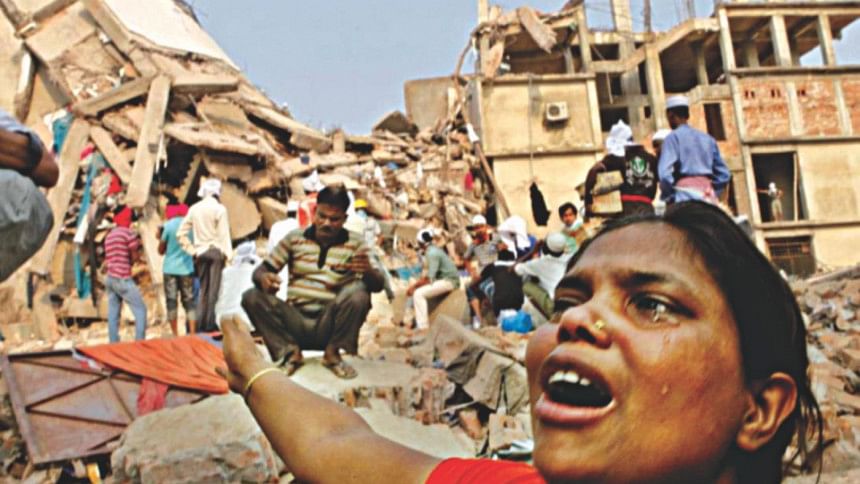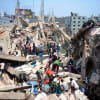Light of hope for Rana Plaza victims

Another anniversary of the deadliest garment industry disaster in history just passed by last week. The time is right to revisit the legal actions that have kept alive hopes of justice and fair compensation in victims and their family members.
The Rana Plaza disaster left 1,134 garment factory workers dead and another 2,500 seriously injured. Those who survived the disaster are left with endless suffering. The families of deceased workers continue to feel traumatised, as credibly evidenced by various media reports and exploratory studies, such as the recent study published by ActionAid Bangladesh and CPD. It is clear that there are significant unmet rehabilitation and support needs among the survivors. As the ActionAid study reveals, the limited rehabilitation services that may still be available to the victims are not adequate. Moreover, the question of management, equity and justice remains pertinent.
The criminal cases filed against the owner of the building and other individuals, including public officials responsible for the disaster, have seen no progress at the court. There can be no question that compensation for the losses suffered is of no less importance than the punishment of the guilty, especially seeing how the victims belong to the poorest sections of our society, and many families have lost their sole breadwinner and are worse off than they were before the incident. When we say 'justice' for the victims of the disaster, we are not talking just about prosecuting the owner of the building and factories or the public entities that could have prevented this disaster from happening; we also want to identify all stakeholders who have contributed to the disaster and profited from the hard work of the garment workers. The government, factory owners, buying houses and buyers should all be held accountable under law for their respective roles in causing this man-made disaster. They should be held legally accountable and made to provide compensation to the survivors and family members of the deceased workers, who have suffered profound losses and damage. Only then we can achieve meaningful justice for the innocent victims of Rana Plaza disaster.
Apart from criminal prosecution of the perpetrators and their abettors who are responsible for the incident, it is pertinent to determine the tortious liability of the corporate buyers, i.e. the international companies which sourced garments from factories located in the building whether through intermediaries, such as buying houses, or directly. It is important to determine their contribution to this catastrophe, and revisit the legal remedies available to the victims of this disaster. Where criminal law focuses on the person committing the crime and his punishment, tort law focuses on the injured and the victim and seeks to compensate him for losses to his person and property.
It is indeed a sign of optimism that many victims of the Rana Plaza collapse have already brought class actions against the buyers based in Canada and USA in the courts of the respective countries, seeking claims of compensation from the buyers for their contribution to the incident. In Canada, the Notice of Action for nearly US$ 2 billion was filed at the Ontario Superior Court on behalf of the victims on April 22, 2015 against Loblaw Inc. and its Joe fresh brand, which used to source from New Wave Style Ltd, a garment factory located within Rana Plaza. The American lawsuit, currently before a Delaware Court, was filed against J.C. Penney, The Children's Place and Walmart, and the amount being sought has been left open.
While none of these cases have been decided as yet, the victory of the Rana Plaza victims will be dependent on whether or not the buyers were negligent on their part and whether – (a) these international companies owed a duty of care to the employees of the suppliers, i.e. the victims and their dependents, and (b) there was a breach of that duty. There is evidence in case law and elsewhere that the buyers owed a duty of care to the victims, who were the employees or family members of the employees of the suppliers.
The denial by the buyers that a duty of care never existed is always accompanied by the argument of the Bangladeshi courts' lack of jurisdiction to try the international companies under tort law. While it is an unpleasant fact that our body of legislations and courts have not adequately developed to entertain tort cases or meaningfully prosecute large international companies that source from our factories through intermediaries, we are inspired to see that tort claims on behalf of Rana Plaza victims are being pursued in the US and Canada. After all, these companies are incorporated in countries where advanced judicial norms and practices are continually evolving to deliver justice to the victims of tortious acts and omissions. These courts in the US and Canada have already exercised jurisdiction in similar cases, and have been open to recognise new kinds of wrongs that are becoming commonplace as the world becomes more connected and large supply chains transcend boundaries.
The authors would like to take this opportunity to make a plea to all concerned authorities, policymakers and powers to take positive steps towards creating a supportive and responsive legislative, judicial, policy and administrative environment needed to address mass torts like Rana Plaza in Bangladesh.
It is heartening for everyone that the Rana Plaza victims have brought these class actions against the buyers in Canada and US. We believe that not only the victims of the Rana Plaza and their families, but all the citizens of our country troubled by these workers' frustrations, and all human beings the world over who are aware of their plight are eagerly waiting to see the outcome of the case, as they hope that the courts in the US and Canada see the merits of the actions and award the appropriate compensation that the victims deserve.
Mostafa M Naser teaches law at the University of Chittagong and Naveed Rahman is enrolled in the LLM Programme of the University of Dhaka.

 For all latest news, follow The Daily Star's Google News channel.
For all latest news, follow The Daily Star's Google News channel. 








Comments